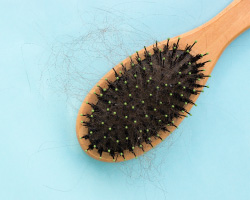
March 13, 2023—See more loose hairs than usual in your brush, on your pillow or when you shower? Don’t worry—excessive shedding is usually temporary. But it might be a sign that it's time to stop the stress cycle.
Shedding happens
It's normal to shed 50 to 150 strands each day. As part of the normal hair life cycle, each scalp hair typically grows for several years and then stops for about three months before falling out of the follicle it grew in. At any given time, about 10% of follicles are in this shedding phase. Then, the process begins again.
But sometimes hair pauses its growth sooner. When that happens, you might notice extra shedding two to three months later.
Several factors can cause that early pause in the hair cycle, including:
- Certain medications or supplements.
- Childbirth.
- Endocrine problems, such as thyroid disorders.
- Inflammatory scalp problems or scalp infections.
- Illness with high fever, such as COVID-19.
- Rapid weight loss, caloric or protein dietary restrictions, and nutritional deficiencies.
- Serious emotional stress.
- Toxins, such as heavy metals.
Hair usually returns to its regular fullness six to nine months after the cause goes away. Look for short hairs of the same length along your hairline around then.
(By the way, losing more hair than normal doesn’t mean you’re going bald. That’s typically a more gradual process.)
Stress and shedding
If shedding is triggered by a temporary cause, such as shedding that happens a few months after giving birth or after a COVID-19 infection, it typically stops a few months after the trigger does. But one common cause of shedding is stress—and if your stress is chronic, your shedding may be chronic too.
To stop the hair-loss cycle, you may need to address the root of the problem: your stress levels. Preventing or coping with stress can help stop the shedding, according to the National Institute of Mental Health. Try these tips:
- Journal. Writing down your thoughts and feelings can reduce anxiety and improve your daily life. It can also help you identify and challenge negative and unhelpful thoughts.
- Do relaxation exercises. These techniques can help you stay in the present and not dwell on the past or worry about the future.
- Adopt healthy habits. Exercise, healthy eating, getting enough sleep and avoiding excess caffeine can really help.
- Reach out to family and friends. Talking with loved ones can help you cope in a positive way.
Talk to your doctor
Stress can affect your health. If you're dealing with chronic stress, it's important to find healthy ways to cope. Check in on your stress levels with our interactive assessment. And let your doctor know if stress is affecting you.
Still shedding? Talk with a dermatologist if your hair doesn’t return to normal in about six to nine months. They can tell the difference between hair shedding and balding. There are effective treatments for many types of hair loss. Starting treatment early really helps.
Sources